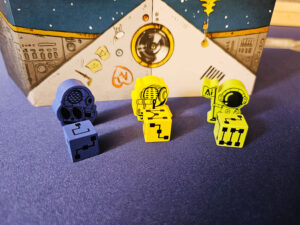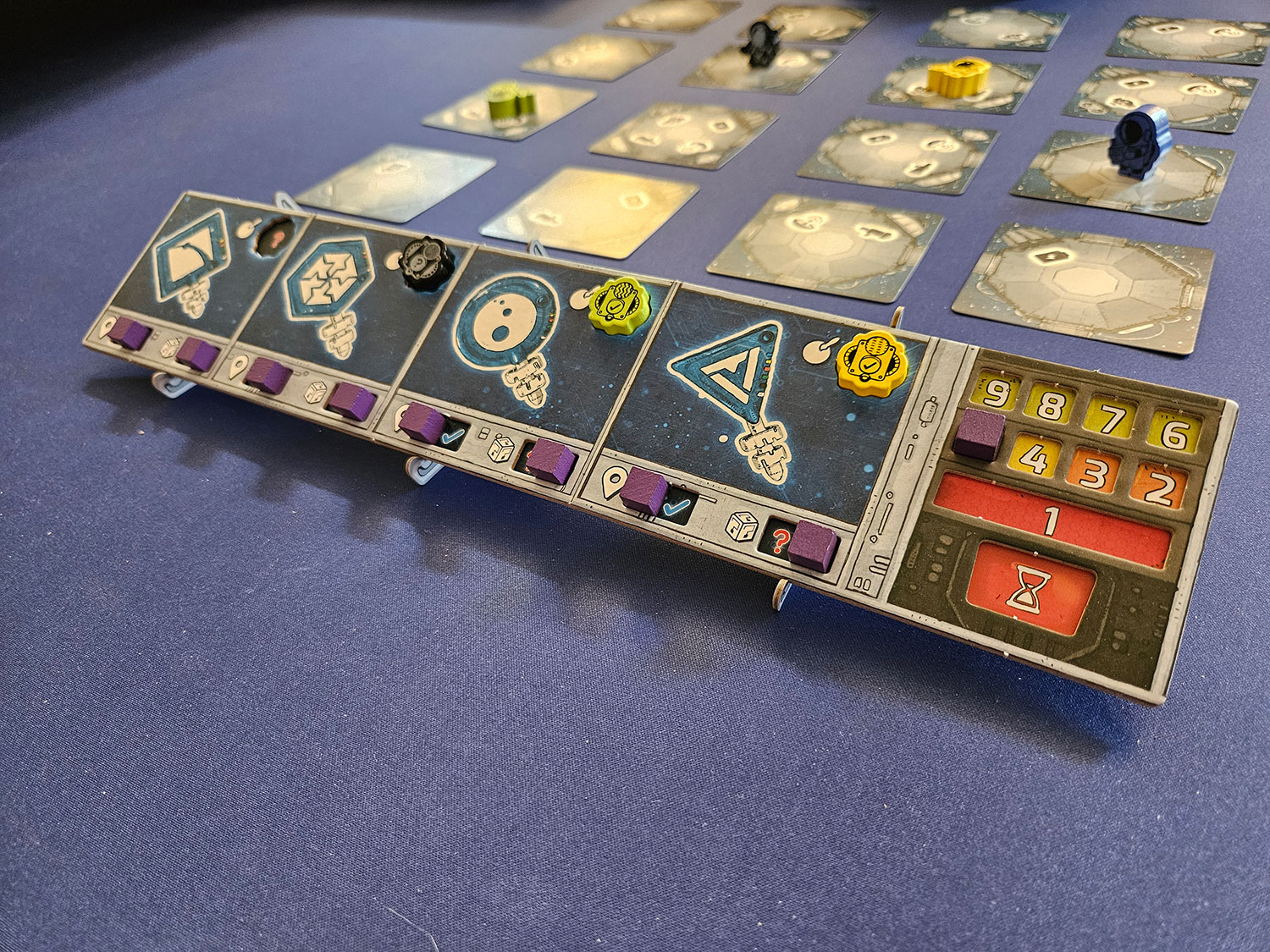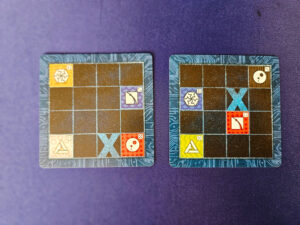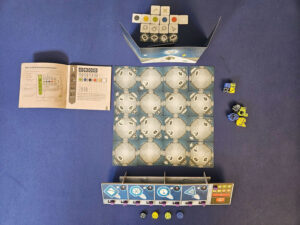 Limited communication co-ops is one of my absolute favorite subgenres in the co-op sphere. With mega hits like The Crew, Sky Team, and this year’s A Message From the Stars, the subgenre is finally gaining in popularity. I was quite enthused to get to try out AI Space Puzzle.
Limited communication co-ops is one of my absolute favorite subgenres in the co-op sphere. With mega hits like The Crew, Sky Team, and this year’s A Message From the Stars, the subgenre is finally gaining in popularity. I was quite enthused to get to try out AI Space Puzzle.
But does it live up to the heights of the other genre staples, or will it fall silent in comparison? AI Space Puzzle is a cooperative deduction game for 2-5 players that takes about 30 minutes to play.
Gameplay Overview:
Earth has been ravaged by nuclear disasters. The surviving refugees were sent out into space, suspended in cryo-sleep. You wake up to the sound of sirens blasting through your ship. The ship’s reactor is malfunctioning, and it’s up to the ship’s damaged AI system to guide you through the repair process.

In AI Space Puzzle, one player will be playing as this damaged AI system, and the other player(s) will be playing as the surviving astronauts trying to figure out what the AI system is communicating to them. It is up to the astronaut players to stand on the correct squares while holding the correct keycards by the end of the game’s countdown. It is up to the AI to get the players to those positions as quickly and as efficiently as possible.
But, due to the damage the AI has sustained, its communication is limited to a few select tiles. Maybe they can communicate the color of a key, but not the room. Maybe they can give a little check mark indicator to enforce a positive choice, or maybe they only have a little “x” indicator to enforce a negative choice.
Each of the game’s 40 scenarios dictates what goals need to be accomplished by the astronauts, and what communication chits the AI player must get them there. It is up to the table to stop the reactor malfunction before it’s too late.

Game Experience:
There’s a lot to love about AI Space Puzzle. First, what a spectacular premise for a game. A lot of limited communication mechanics exist for the sake of gameplay with no thematic reason as to why players cannot communicate, so incorporating one is a nice change of pace. Second, this game strikes gold with its balance of rules to complexity. I prefer co-op games to be simpler fares in the first place, but that’s especially true when the spirit of the game encourages players to not talk to one another. If there are too many “gotcha!” rules or complicated systems, then it can become too much for players to keep up with.

Third, the way in which communication is limited is brilliant. Oftentimes limited communication is still verbal communication (or complete lack thereof) instead of a replacement for verbal communication. However, since communication has been replaced with unique tiles with different symbols on them, the additional avenues of communication that open up are only limited to the player’s imagination. The rules are purposefully vague on what the AI player can and cannot do with their tiles. For instance, if the AI player is allowed to show five communication tiles in a given scenario, then those five tiles could all point towards the same clue, or they could be separated into two groups to give two different (albeit vaguer) clues.
Honestly, my largest complaint with the game is not with how one game of AI Space Puzzle shakes out, but more with the metagaming surrounding the scenario design.
Let’s look at The Mind, as an example. It’s a simple game where players must play their random hand of cards to the middle of the table in numerical order, without talking to one another. The first round each player gets one card, the second round they get two cards, etc. This internal sense of progression leads to the table getting an understanding of each other’s “internal monologue” and internal pacing rather intuitively over the course of one game.

However, in AI Space Puzzle, this natural understanding of the metalanguage of the game takes much longer to grasp. The people that I played this with developed a pretty consistent metalanguage after three or four scenarios, and it was this metalanguage that carried us to victory in later and more difficult scenarios. Crucially, though, that was after roughly an hour of playtime together where we were stumbling and sometimes even getting quite frustrated at how our understanding was developing. While this is not inherently a bad thing, and the rulebook even suggests playing several scenarios back-to-back, it just makes the natural progression of the game feel clunkier than other limited communication titles I’ve played.
The only other minor note I have is about the game’s longevity. With it being scenario-driven, there’s a part of me that is worried about the replay value of the game. I think that the scenarios have enough variability within them that even replaying the same five scenarios would be a good time, but I suppose only time will tell.
Final Thoughts:
If you’re looking for a limited communication co-op with one of the most unique communication methods out there, please give AI Space Puzzle a chance. It’s a cheaper game with a low rules overhead, and the team dynamic means it really only takes one player who understands the game to play it. I’ve enjoyed this as a quiet, contemplative game with my partner, and an uproarious, hilarious game with my family. My biggest criticism is that higher level play takes several scenarios to develop, so if you’re looking to complete those more difficult scenarios, it’s quite difficult to jump into them without ramping up over several games.
Final Score: 4 Stars – I can’t talk to you, Dave.
 Hits:
Hits:
• Unique communication method
• Highly variable player count
• Fun for all experience levels
Misses:
• Metalanguage takes too long to develop
• Cheaper production
• Colorblind symbology is confusing





















